人教版(2019) 选择性必修第二册 Unit 2 Bridging Cultures Assessing your progress and Workbook 课件(23张ppt)
文档属性
| 名称 | 人教版(2019) 选择性必修第二册 Unit 2 Bridging Cultures Assessing your progress and Workbook 课件(23张ppt) |
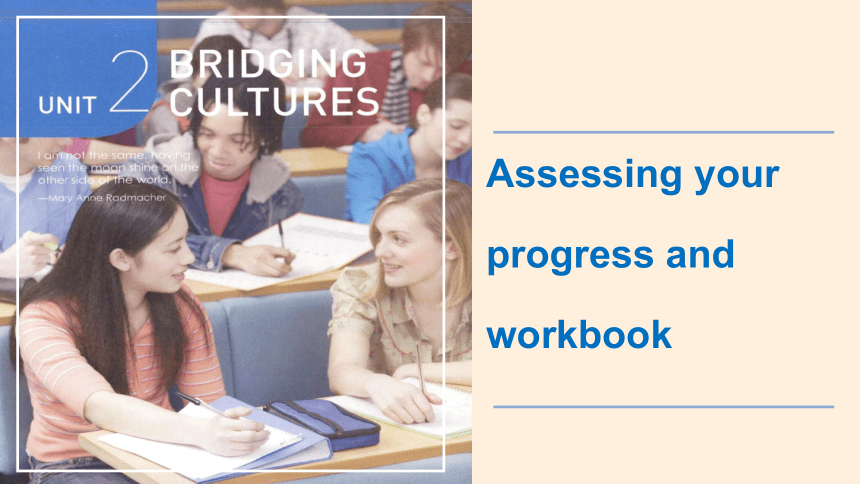
|
|
| 格式 | pptx | ||
| 文件大小 | 3.8MB | ||
| 资源类型 | 教案 | ||
| 版本资源 | 人教版(2019) | ||
| 科目 | 英语 | ||
| 更新时间 | 2022-10-25 00:00:00 | ||
图片预览

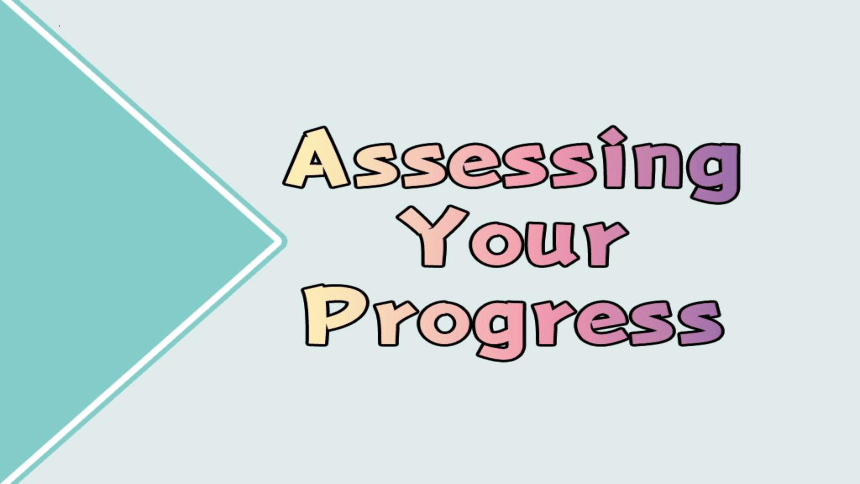
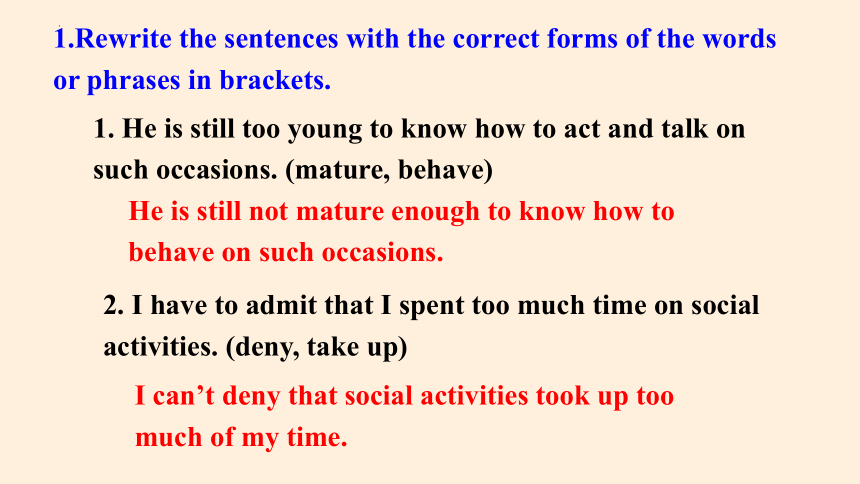
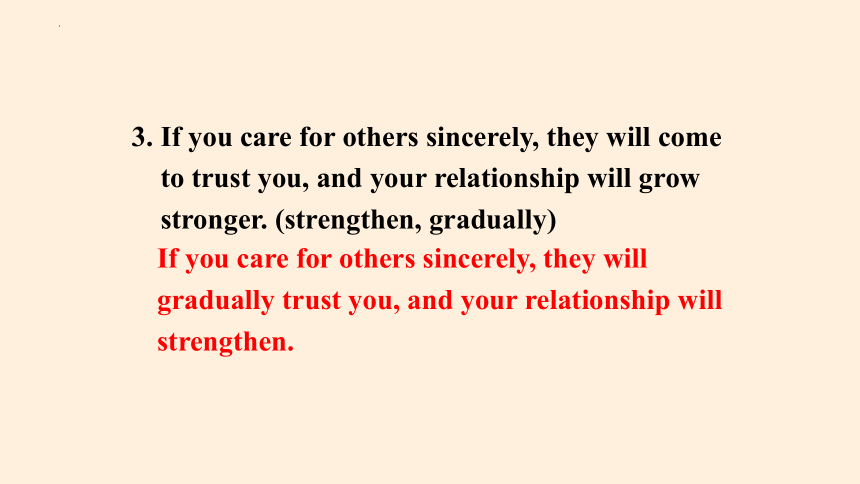
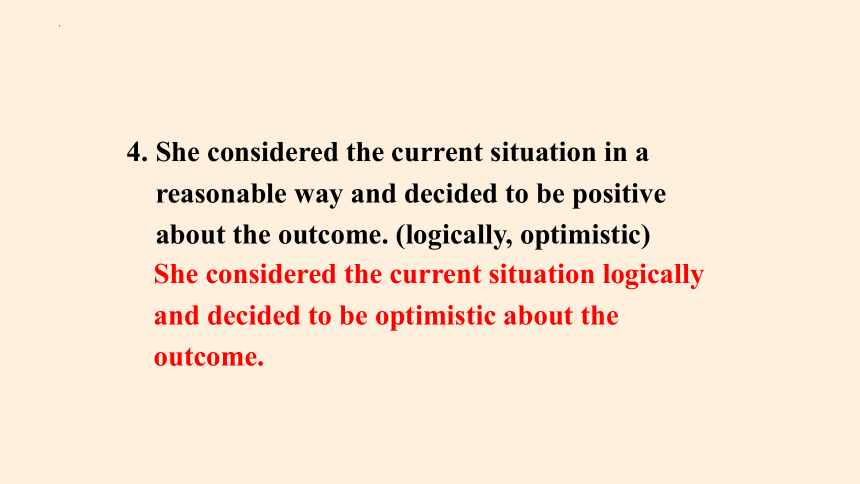
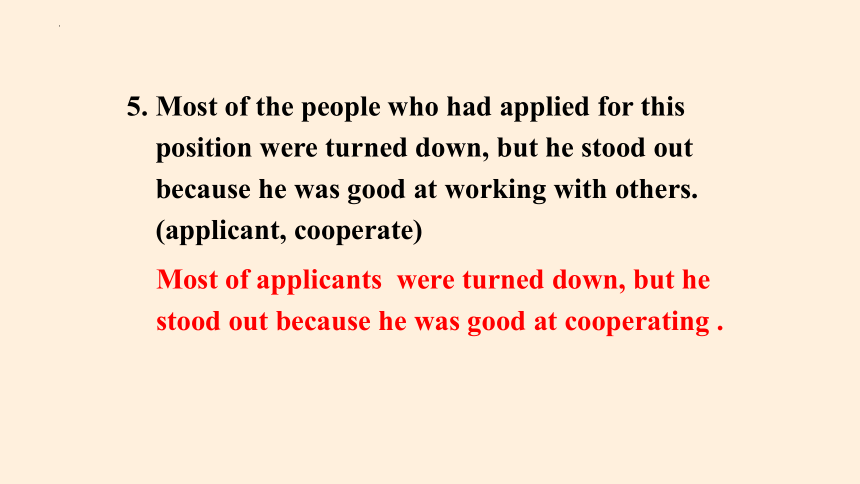
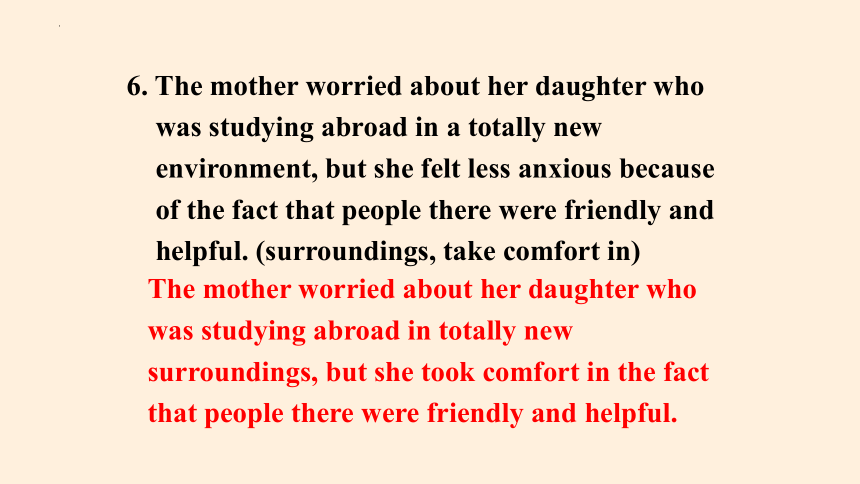
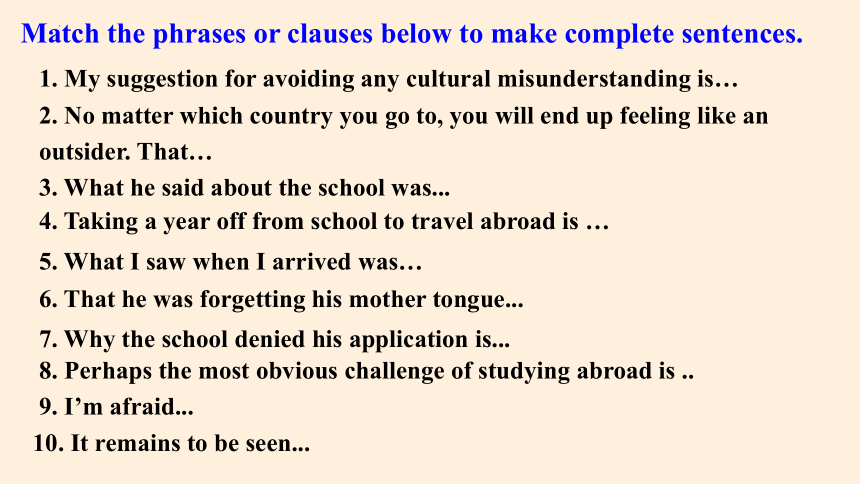
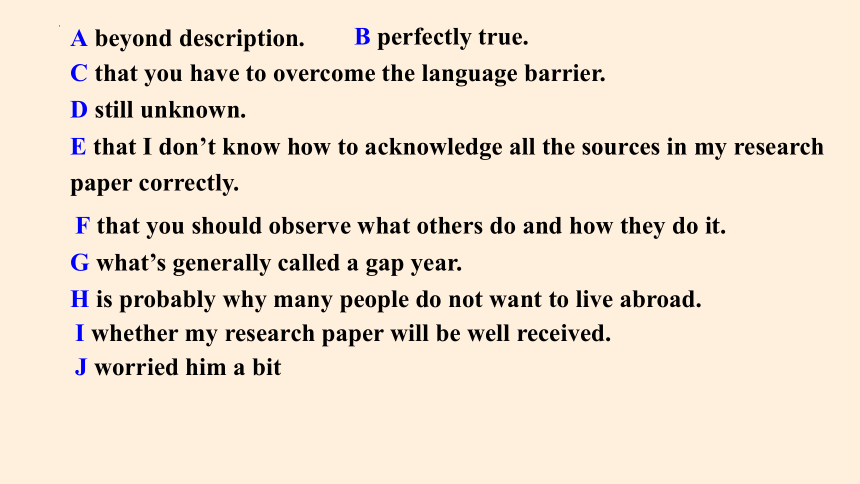
文档简介
(共23张PPT)
Assessing your
progress and
workbook
1.Rewrite the sentences with the correct forms of the words or phrases in brackets.
1. He is still too young to know how to act and talk on such occasions. (mature, behave)
2. I have to admit that I spent too much time on social activities. (deny, take up)
He is still not mature enough to know how to behave on such occasions.
I can’t deny that social activities took up too much of my time.
3. If you care for others sincerely, they will come
to trust you, and your relationship will grow
stronger. (strengthen, gradually)
If you care for others sincerely, they will gradually trust you, and your relationship will strengthen.
4. She considered the current situation in a
reasonable way and decided to be positive
about the outcome. (logically, optimistic)
She considered the current situation logically and decided to be optimistic about the outcome.
5. Most of the people who had applied for this
position were turned down, but he stood out
because he was good at working with others.
(applicant, cooperate)
Most of applicants were turned down, but he stood out because he was good at cooperating .
6. The mother worried about her daughter who
was studying abroad in a totally new
environment, but she felt less anxious because
of the fact that people there were friendly and
helpful. (surroundings, take comfort in)
The mother worried about her daughter who was studying abroad in totally new surroundings, but she took comfort in the fact that people there were friendly and helpful.
Match the phrases or clauses below to make complete sentences.
1. My suggestion for avoiding any cultural misunderstanding is…
2. No matter which country you go to, you will end up feeling like an outsider. That…
3. What he said about the school was...
4. Taking a year off from school to travel abroad is …
5. What I saw when I arrived was…
6. That he was forgetting his mother tongue...
7. Why the school denied his application is...
8. Perhaps the most obvious challenge of studying abroad is ..
9. I’m afraid...
10. It remains to be seen...
A beyond description.
B perfectly true.
C that you have to overcome the language barrier.
D still unknown.
E that I don’t know how to acknowledge all the sources in my research paper correctly.
F that you should observe what others do and how they do it.
G what’s generally called a gap year.
H is probably why many people do not want to live abroad.
I whether my research paper will be well received.
J worried him a bit
5 – A
6 – J
4 – G
7 – D
1 – F
2 – H
3 – B
8 – C
10 – I
9 – E
presentation
expectation
cooperation
motivation
qualification
participation
application
adaptation
acknowledgement
involvement
requirement
encouragement
departure
exposure
felt at home
costs an arm and a leg
speak up
sided with
is engaged/involved in
1. Motivated by his uncle’s encouragement,he promised to do his best to live up to his family’s expectations when studying abroad /overseas.
2.As far as I know, the firm’s expenses would be much higher than what their budget allowed, so they decided to revise their plan in order to be more competitive overall.
3. Before her departure, she was depressed when she recalled all
the happy times she had spent with her friends and realised that she
might not see them for a long time.
4. Generally speaking, a greater exposure to the rest of the world
will help you to see things from different angles.
5. Attending university isn’t just about grasping the opportunity
to further your studies, but is also about gaining greater insight
into the world around you.
4.Complete the passage with the correct forms of the words in the box. Did the writer think it was a good idea to study abroad Why
gain cooperation strength angle surround
depress behave competent dramatic
Studying abroad in Amman, Jordan, was a life changing experience for me. Every day was an adventure because life there was ___________ different from that at home. As you know, Jordan is in the Middle East. There were so many challenges and cultural norms I had to adapt to, and I needed to learn how to __________ in new _____________and ___________ with people from different cultural backgrounds.
dramatically
behave
surroundings
cooperate
Fortunately, everyone I met there was understanding and welcoming. I applied through International Studies Abroad (ISA), and they were incredibly helpful and made the process less __________ and overwhelming. Studying abroad let me see things from new ___________ and learn more about cultures around me. I hope everyone gets the opportunity to pursue further studies abroad and to _________ an understanding of different cultures, too. l believe studying abroad can help you ____________ your abilities in cross-cultural communication and improve your general ___________.
depressing
angels
gain
strengthen
competence
1. It is strange to me that students have to
change classrooms for each lesson,because
in my country teachers move around.
2. Whether a J-1 visa or an F-1 visa is
needed is not known to many exchange
students.
3. That a host family has received training
in hosting exchange students is clear from
how their support their guests.
4. An advice for exchange students is that
they should learn how to report cases
of crimes to the police.
that
^
It
^
That
why
is
3.Complete the passage about culture shock with the words from the box. What are the four stages of it How do you think people can overcome culture shock
what that who when whatever because
_____ people move to a new country they often feel worried and stressed _______ they don’t know the customs and traditions of the new place. This feeling is _____ is generally called “culture shock”. Kalervo Oberg was the one ____ first used this phrase. According to Oberg, there are several stages of culture shock. First there is the honeymoon period.
When
because
what
who
During this period, people experience is fresh and exciting to them. In the next stage, frustration, people notice more differences between their own culture and the new one. _____ people usually do about these differences is either to change their behaviour or return to their home country. If people stay, they come to the third stage which occurs ______ they begin to adjust to the new culture. They begin to become familiar with the customs, the thinking, and the habits of the new place. Acceptance is the fourth stage. People finally begin to fit into the new culture. Differences no longer trouble them as much and they feel _____ they might actually belong in the new place.
whatever
What
when
that
Assessing your
progress and
workbook
1.Rewrite the sentences with the correct forms of the words or phrases in brackets.
1. He is still too young to know how to act and talk on such occasions. (mature, behave)
2. I have to admit that I spent too much time on social activities. (deny, take up)
He is still not mature enough to know how to behave on such occasions.
I can’t deny that social activities took up too much of my time.
3. If you care for others sincerely, they will come
to trust you, and your relationship will grow
stronger. (strengthen, gradually)
If you care for others sincerely, they will gradually trust you, and your relationship will strengthen.
4. She considered the current situation in a
reasonable way and decided to be positive
about the outcome. (logically, optimistic)
She considered the current situation logically and decided to be optimistic about the outcome.
5. Most of the people who had applied for this
position were turned down, but he stood out
because he was good at working with others.
(applicant, cooperate)
Most of applicants were turned down, but he stood out because he was good at cooperating .
6. The mother worried about her daughter who
was studying abroad in a totally new
environment, but she felt less anxious because
of the fact that people there were friendly and
helpful. (surroundings, take comfort in)
The mother worried about her daughter who was studying abroad in totally new surroundings, but she took comfort in the fact that people there were friendly and helpful.
Match the phrases or clauses below to make complete sentences.
1. My suggestion for avoiding any cultural misunderstanding is…
2. No matter which country you go to, you will end up feeling like an outsider. That…
3. What he said about the school was...
4. Taking a year off from school to travel abroad is …
5. What I saw when I arrived was…
6. That he was forgetting his mother tongue...
7. Why the school denied his application is...
8. Perhaps the most obvious challenge of studying abroad is ..
9. I’m afraid...
10. It remains to be seen...
A beyond description.
B perfectly true.
C that you have to overcome the language barrier.
D still unknown.
E that I don’t know how to acknowledge all the sources in my research paper correctly.
F that you should observe what others do and how they do it.
G what’s generally called a gap year.
H is probably why many people do not want to live abroad.
I whether my research paper will be well received.
J worried him a bit
5 – A
6 – J
4 – G
7 – D
1 – F
2 – H
3 – B
8 – C
10 – I
9 – E
presentation
expectation
cooperation
motivation
qualification
participation
application
adaptation
acknowledgement
involvement
requirement
encouragement
departure
exposure
felt at home
costs an arm and a leg
speak up
sided with
is engaged/involved in
1. Motivated by his uncle’s encouragement,he promised to do his best to live up to his family’s expectations when studying abroad /overseas.
2.As far as I know, the firm’s expenses would be much higher than what their budget allowed, so they decided to revise their plan in order to be more competitive overall.
3. Before her departure, she was depressed when she recalled all
the happy times she had spent with her friends and realised that she
might not see them for a long time.
4. Generally speaking, a greater exposure to the rest of the world
will help you to see things from different angles.
5. Attending university isn’t just about grasping the opportunity
to further your studies, but is also about gaining greater insight
into the world around you.
4.Complete the passage with the correct forms of the words in the box. Did the writer think it was a good idea to study abroad Why
gain cooperation strength angle surround
depress behave competent dramatic
Studying abroad in Amman, Jordan, was a life changing experience for me. Every day was an adventure because life there was ___________ different from that at home. As you know, Jordan is in the Middle East. There were so many challenges and cultural norms I had to adapt to, and I needed to learn how to __________ in new _____________and ___________ with people from different cultural backgrounds.
dramatically
behave
surroundings
cooperate
Fortunately, everyone I met there was understanding and welcoming. I applied through International Studies Abroad (ISA), and they were incredibly helpful and made the process less __________ and overwhelming. Studying abroad let me see things from new ___________ and learn more about cultures around me. I hope everyone gets the opportunity to pursue further studies abroad and to _________ an understanding of different cultures, too. l believe studying abroad can help you ____________ your abilities in cross-cultural communication and improve your general ___________.
depressing
angels
gain
strengthen
competence
1. It is strange to me that students have to
change classrooms for each lesson,because
in my country teachers move around.
2. Whether a J-1 visa or an F-1 visa is
needed is not known to many exchange
students.
3. That a host family has received training
in hosting exchange students is clear from
how their support their guests.
4. An advice for exchange students is that
they should learn how to report cases
of crimes to the police.
that
^
It
^
That
why
is
3.Complete the passage about culture shock with the words from the box. What are the four stages of it How do you think people can overcome culture shock
what that who when whatever because
_____ people move to a new country they often feel worried and stressed _______ they don’t know the customs and traditions of the new place. This feeling is _____ is generally called “culture shock”. Kalervo Oberg was the one ____ first used this phrase. According to Oberg, there are several stages of culture shock. First there is the honeymoon period.
When
because
what
who
During this period, people experience is fresh and exciting to them. In the next stage, frustration, people notice more differences between their own culture and the new one. _____ people usually do about these differences is either to change their behaviour or return to their home country. If people stay, they come to the third stage which occurs ______ they begin to adjust to the new culture. They begin to become familiar with the customs, the thinking, and the habits of the new place. Acceptance is the fourth stage. People finally begin to fit into the new culture. Differences no longer trouble them as much and they feel _____ they might actually belong in the new place.
whatever
What
when
that
